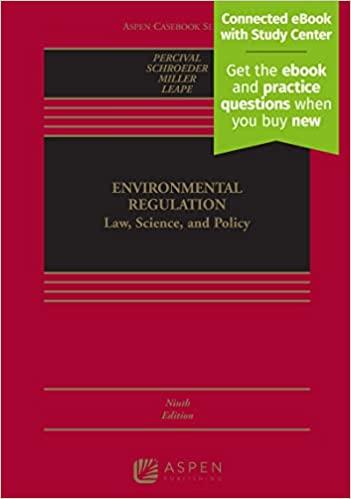Question
Assignment 8 Counter analysisLegal Position or Argument Based on Case Law In the following example, assume that the only court opinion on point is United
Assignment 8
Counter analysisLegal Position or Argument Based on Case Law
In the following example, assume that the only court opinion on point is United States v. Leon (see Appendix A).
Facts: Officer Jones submits to Judge Bean a request for a search warrant for the search of Steve's apartment. Officer Jones knows that there is not sufficient probable cause for issuance of the warrant, but he also knows that Judge Bean favors law enforcement and will most likely issue the warrant anyway. Judge Bean issues the warrant. Officer Jones gives the warrant to other officers and instructs them to execute it. He does not tell them that he knows it is defective because of the lack of probable cause for its issuance. The other officers execute the warrant in the good-faith belief that it is valid. The officers find drugs, and charge Steve with possession. Steve moves for suppression of the evidence, claiming that the search was illegal, and the evidence must be excluded under the exclusionary rule. What is the counterargument to the prosecution's position in each of the following situations?
Part A The prosecution argues that because the officers executing the warrant were acting in the good-faith belief that the warrant was valid; United States v. Leon governs the case. The good-faith exception to the exclusionary rule applies, and therefore the evidence should not be suppressed.
Part B Same facts except that Officer Jones delivers the warrant to members of the Citizens Protection Association, a private group of citizens trained by the police to assist in the performance of minor police functions. The group volunteers its services and is not employed by the police. They execute the warrant and make a citizen's arrest of Steve. The prosecution argues that United States v. Leon governs, and that case holds that the exclusionary rule is designed only to protect against police misconduct, not misconduct by private citizens.
Assignment 5
The client, Mrs. Tatum, purchased a new microwave oven from Inki Appliances Company. No written or oral warranty was given when the sale was made. The microwave stopped working one week after Mrs. Tatum took it home. She returned the micro-wave three days after it quit working. The owner of Inki Appliances refused to repair or replace the micro-wave or give Mrs. Tatum her money back. Prepare demand letter to be sent to Inki Appliances. The letter is to be signed by your supervising attorney, Alice Black. Use the letterhead presented in the Application section of this chapter. Mr. Terry Spear is the president and owner of Inki Appliances Company, and the address is 1001 Maple Drive, Friendly, NW 00065.
Statutory Law: Section 50-102-314 of the New Washington statutes provides that "a warranty that the goods shall be merchantable is implied . . . if the seller is a merchant with respect to the goods of that kind." Mr. Spear is a merchant. Mrs. Tatum did not misuse the microwave or in any other way cause it to quit working.
Case Law: The case on point is Smith v. Appliance City, 56 N. Wash. 162, 868 N.E. 997 (1995). In Smith, the New Washington supreme court ruled that the seller has three options when an implied warranty is breached: return the purchase price to the buyer, repair the merchandise, or replace the merchandise.
Step by Step Solution
There are 3 Steps involved in it
Step: 1

Get Instant Access to Expert-Tailored Solutions
See step-by-step solutions with expert insights and AI powered tools for academic success
Step: 2

Step: 3

Ace Your Homework with AI
Get the answers you need in no time with our AI-driven, step-by-step assistance
Get Started


